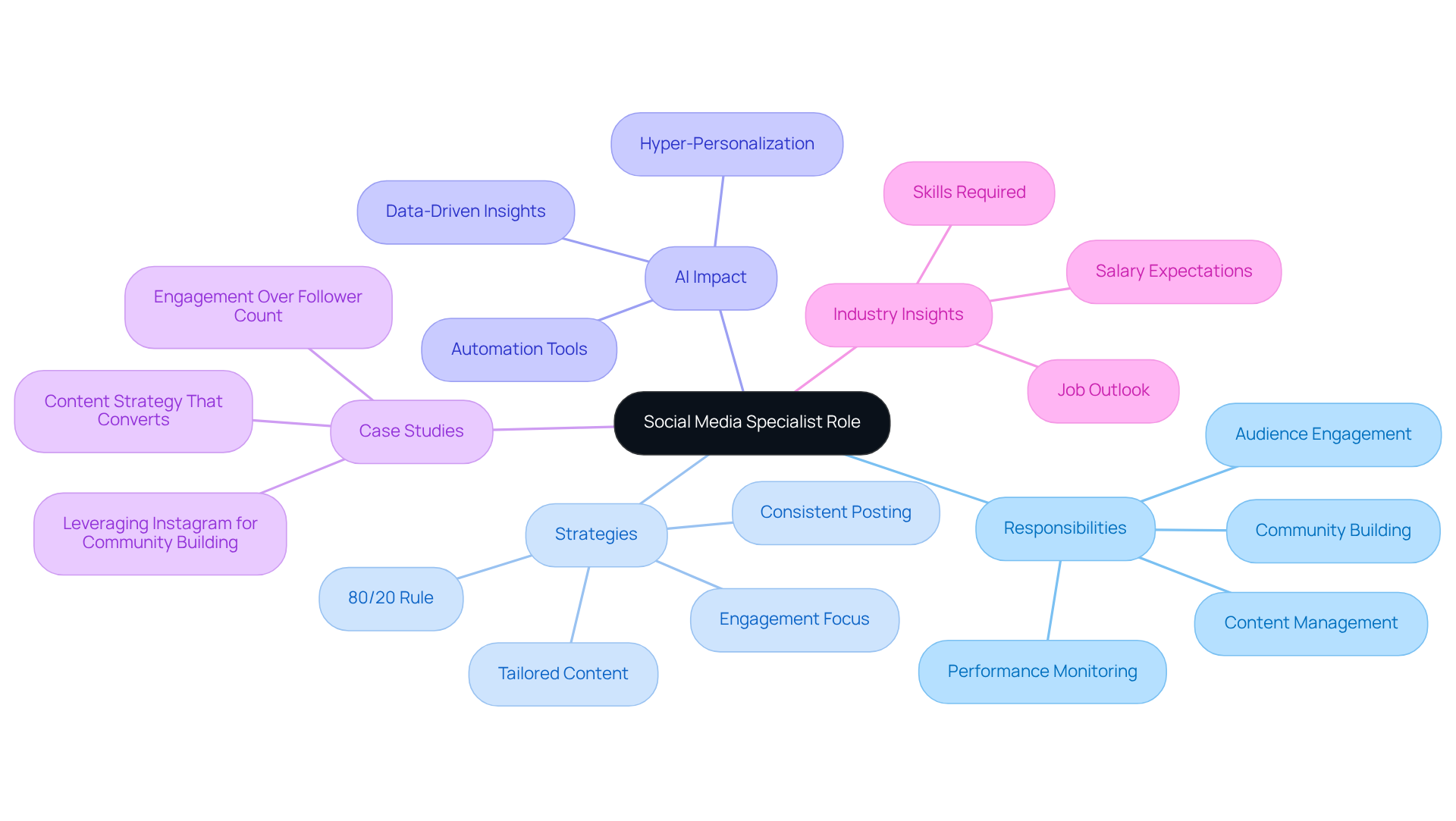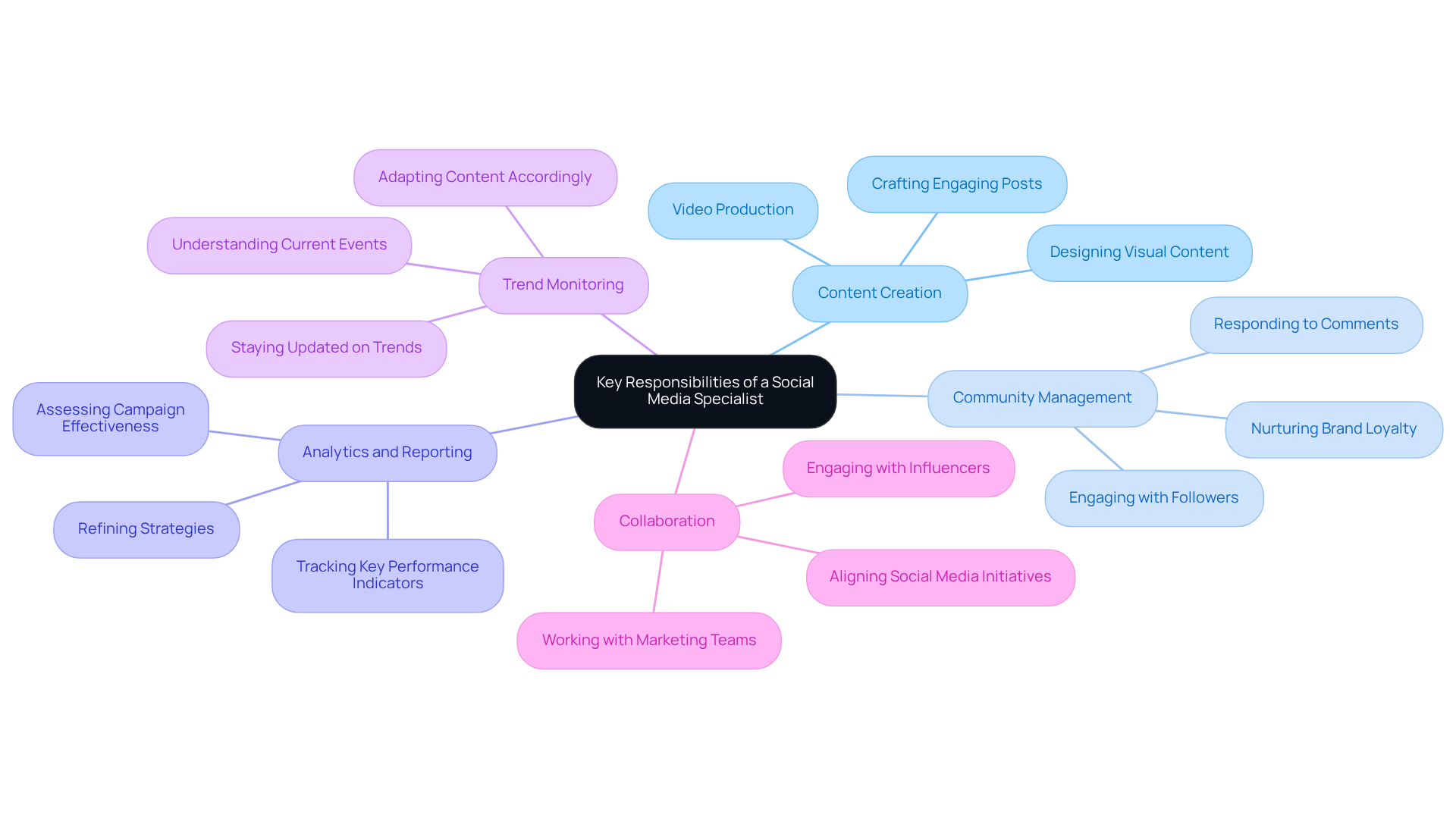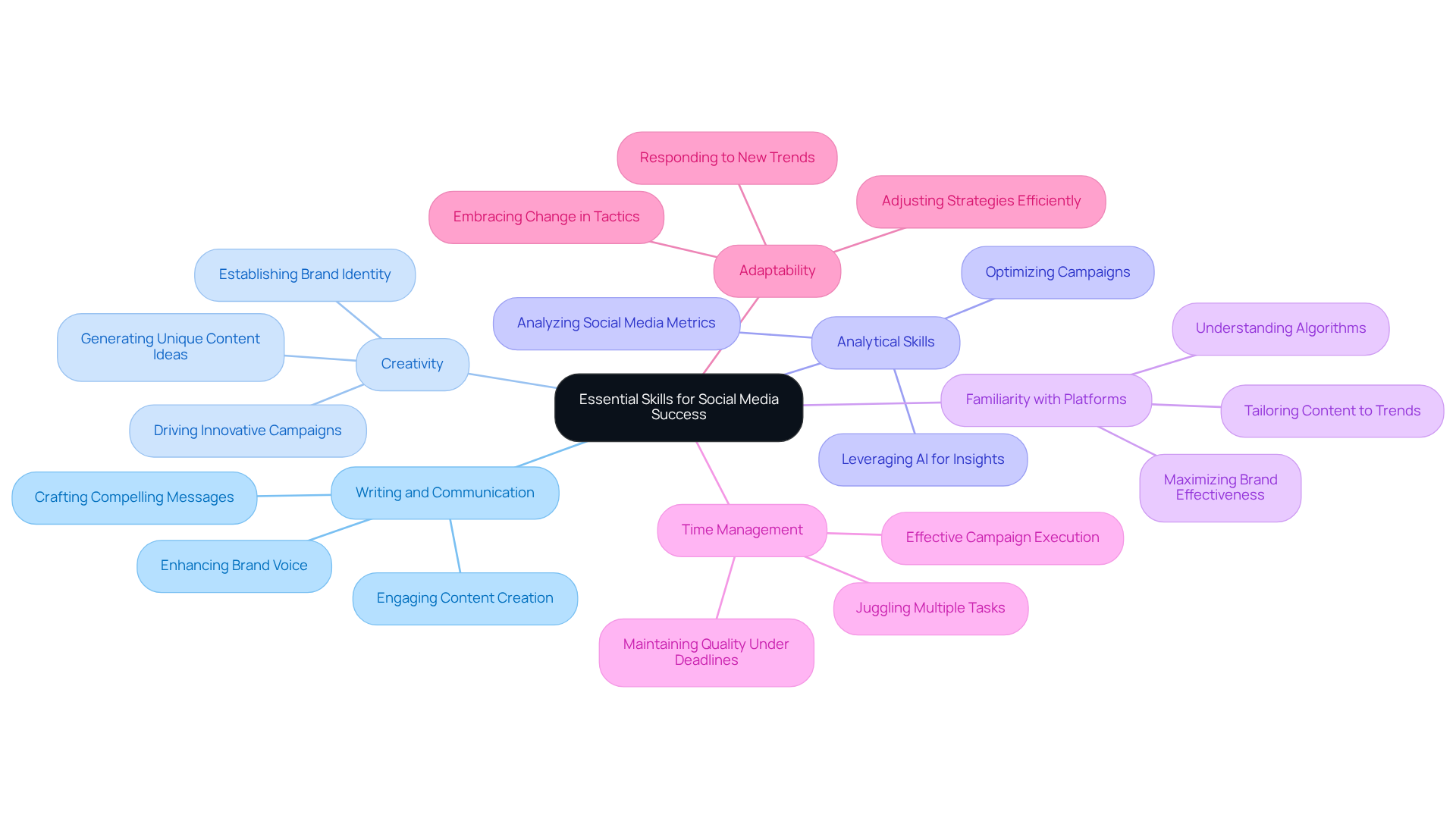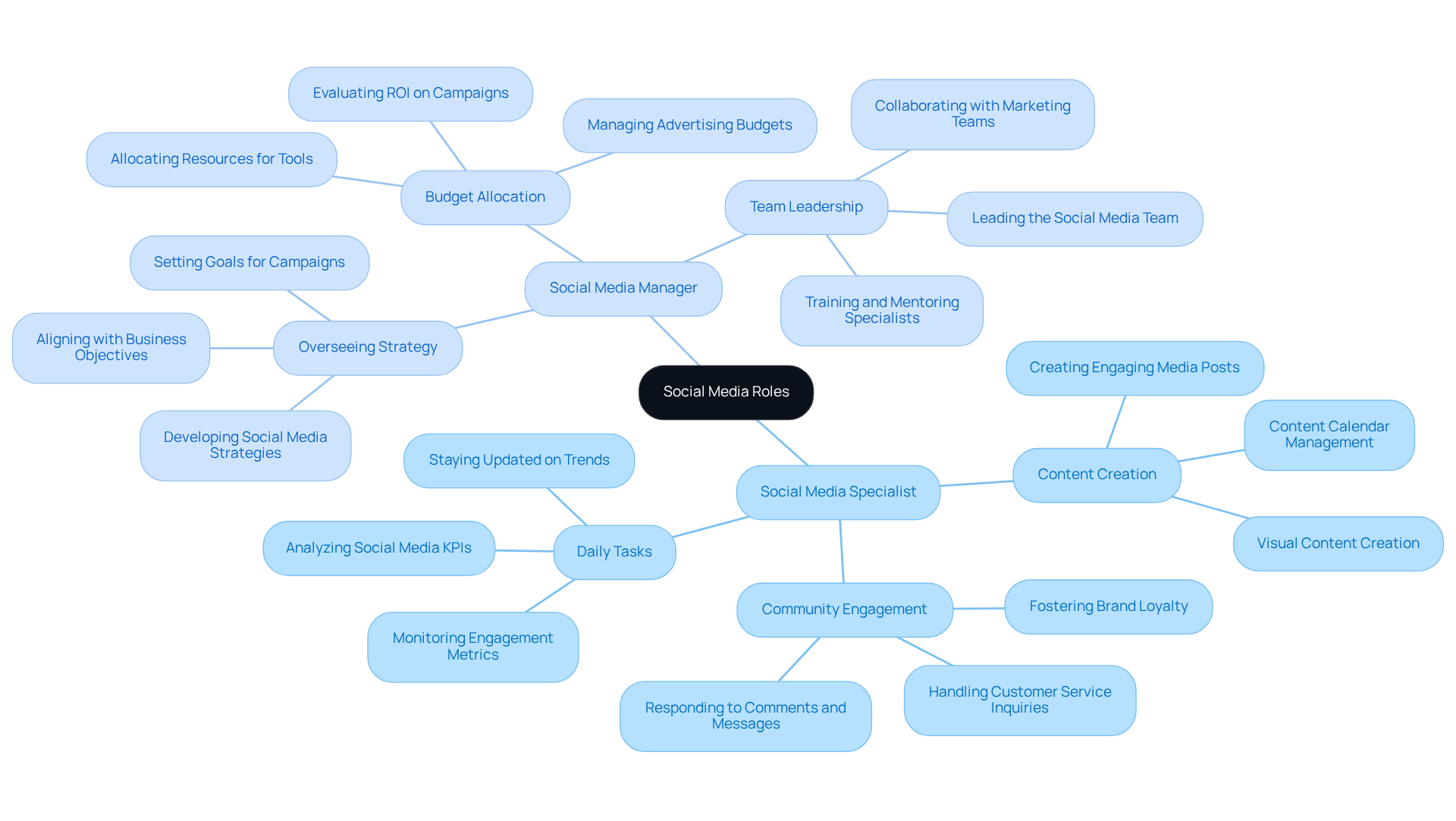Overview
The article underscores the pivotal role of a social media specialist, asserting its critical importance in managing online content and engagement strategies for companies. Social media specialists are indispensable for amplifying brand visibility and fostering audience interaction. Their responsibilities encompass:
- Content creation
- Analytics
- Community management
All of which are essential for effective digital marketing in an increasingly online-centric business environment. This expertise not only enhances a brand's presence but also drives meaningful engagement with target audiences, making the role of a social media specialist more crucial than ever in today's digital landscape.
Introduction
The rise of digital communication has fundamentally transformed how companies connect with their audiences, rendering the role of a social media specialist more vital than ever. This article explores the multifaceted responsibilities and skills required for these professionals, underscoring their significant impact on brand visibility and customer engagement. As businesses endeavor to harness the power of social media, it becomes crucial to effectively differentiate between the roles of specialists and managers to maximize their online strategies.
Defining the Social Media Specialist Role
A social media specialist is pivotal in orchestrating and executing a company's online strategy, focusing on the development, organization, and management of content across platforms such as Facebook, Instagram, Twitter, and LinkedIn. This professional is committed to enhancing visibility, fostering audience engagement, and driving traffic to the company's website. In contrast to a Community Manager, who oversees broader strategies and team dynamics, the Specialist zeroes in on the daily operations of engagement and content creation. As companies increasingly recognize the influence of social media in shaping narratives and connecting with consumers in real-time, the role of a social media specialist has become increasingly important.
By 2025, the demand for Social Network Specialists is projected to rise significantly, driven by the need for companies to maintain a consistent online presence and engage effectively with their audiences. Successful strategies adhere to the 80/20 rule, where 80% of content is valuable and engaging, while only 20% is promotional. This approach not only builds trust but also positions companies as industry authorities.
With the advent of AI, Social Networking Specialists can elevate customer experiences through hyper-personalized interactions tailored to individual preferences. By harnessing AI-driven insights, including performance data analysis and content generation capabilities, they can craft content that resonates more profoundly with audiences, ultimately boosting conversion rates. Furthermore, automation and custom bots that mimic human speech can enhance engagement by delivering timely and relevant responses to customer inquiries.
Case studies illustrate the impact of Social Network Specialists on visibility and engagement. For example, businesses utilizing YouTube for video engagement have discovered that optimized Shorts yield SEO exposure, while long-form content nurtures deeper customer connections. Likewise, a consistent posting strategy across platforms amplifies engagement rates, demonstrating that tailored content can significantly enhance audience interaction.
Industry leaders emphasize the critical role of social media specialists in brand strategy. As Cerian Swain from Business Show observes, "The companies that thrive on online platforms are those that view it as a relationship-building tool rather than merely a broadcasting channel." This perspective underscores the evolving nature of online platforms, where interaction and community development are vital for success. In a landscape where the average individual spends over two hours each day on social platforms, the role of the social media specialist becomes increasingly crucial, ensuring that companies not only reach but also genuinely connect with their target audiences.

Key Responsibilities and Daily Tasks
The daily duties of a social media specialist include a variety of essential tasks that are vital for effective management in 2025. The key responsibilities include:
- Content Creation: Crafting engaging posts, graphics, and videos tailored to resonate with the target audience. Posts featuring images and videos significantly boost engagement, as consumers increasingly prefer visual content.
- Community Management: Actively engaging with followers by replying to comments and messages, nurturing a sense of community around the organization. This engagement is crucial for building loyalty and enhancing customer relationships.
- Analytics and Reporting: Tracking online platform metrics to assess campaign effectiveness. Specialists analyze key performance indicators such as likes, shares, and comments to refine strategies and optimize content effectiveness.
- Trend Monitoring: Keeping informed about online trends and platform updates to ensure the identity remains relevant and competitive. This includes understanding current events and pop culture, which can inform timely and engaging content.
- Collaboration: Working closely with other marketing team members to align social media initiatives with broader marketing campaigns and objectives. This collaboration enhances the overall effectiveness of marketing strategies.
These responsibilities are vital for establishing a robust online presence and ensuring that the brand's voice resonates with its audience. As the job outlook for advertising, promotions, and marketing professionals is expected to increase by 8 percent from 2023 to 2033, the demand for skilled social media specialists continues to rise, emphasizing the significance of these roles in today's digital environment.

Essential Skills and Qualifications for Success
To excel as a social media specialist, individuals must cultivate a combination of technical and soft skills that are essential for success in the dynamic digital landscape. Key competencies include:
- Strong Writing and Communication Skills: Crafting compelling messages that resonate with the audience is fundamental. Effective writing not only enhances brand voice but also drives engagement, as seen in successful campaigns that leverage clear and engaging content.
- Creativity: The ability to generate unique content ideas is essential for standing out in a crowded marketplace. Creativity drives innovative campaigns that attract interest and encourage audience engagement, establishing it as a cornerstone of effective online marketing in 2025.
- Analytical Skills: Proficiency in analyzing social media metrics is vital for optimizing campaigns. Understanding engagement rates, reach, and audience behavior allows a social media specialist to refine strategies and improve performance. Notably, 88% of marketers rely on AI for content generation and insights, underscoring the importance of analytical skills in this role. By leveraging AI, specialists can create hyper-personalized interactions that significantly enhance customer engagement and conversion rates.
- Familiarity with Social Media Platforms: A deep understanding of various platforms, their algorithms, and best practices is necessary for effective content distribution. This knowledge enables a social media specialist to tailor content that aligns with platform-specific trends and user preferences, maximizing brand effectiveness.
- Time Management: The ability to juggle multiple tasks and deadlines while maintaining quality is crucial in a fast-paced environment. Effective time management by a social media specialist ensures that campaigns are executed smoothly and on schedule.
- Adaptability: Being open to change and quick to respond to new trends or platform updates is essential for staying relevant. The online platform environment is constantly changing, and flexibility enables social media specialists to adjust their tactics efficiently. With 49% of organizations considering customer service as a marketing responsibility, the necessity for adaptability in strategy is more crucial than ever. Furthermore, the application of automations and tailored bots that imitate human speech can improve communication and responsiveness in online interactions.
These skills not only improve the efficiency of online strategies but also play a major role in the overall success of a social media specialist's marketing efforts. As noted by industry experts, the integration of creativity and strong writing skills is paramount in crafting narratives that engage audiences and drive action, especially when combined with AI-driven approaches that personalize customer experiences. Overskies exemplifies this integration by leveraging AI to create tailored customer interactions.

Comparing Social Media Specialists and Managers
Social Network Experts and Administrators are both essential components of a company's online strategy, yet their roles are distinctly different. Specialists concentrate on executing daily tasks, such as content creation and community engagement, to ensure that the brand maintains a vibrant online presence. They actively interact with audiences and craft relatable stories that resonate with followers. In contrast, Managers oversee the broader online strategy, directing marketing initiatives, allocating budgets, and leading the team.
Typically, a Social Media Specialist may require less experience compared to a Manager, who often has a more extensive background in marketing and leadership. Managers make high-level decisions that influence the overall online presence strategy, while Specialists focus on the efficient execution of these tactics.
Understanding these distinctions is crucial for organizations aiming to structure their marketing teams effectively. Effective team frameworks frequently consist of a mix of both roles, enabling a comprehensive strategy for online marketing. Case studies reveal that brands with clearly defined roles experience enhanced engagement and improved campaign performance, as each team member can focus on their specific strengths.
As the demand for online platform expertise continues to increase, organizations must recognize the unique contributions of both Online Specialists and Managers. This clarity aids in recruitment and ensures that marketing teams are equipped to navigate the complexities of the digital landscape. Furthermore, leveraging AI through automation and custom bots can enhance personalized customer experiences, further supporting the roles of Specialists and Managers. As Lanae, a social media specialist, emphasizes, 'As social media evolves and grows, you need to constantly look for ways to improve.

Conclusion
The role of a social media specialist is vital for businesses aiming to thrive in the digital landscape. This professional not only manages content and engagement across various platforms but also plays a crucial part in shaping brand narratives and fostering genuine connections with audiences. As organizations increasingly recognize the significance of social media, the responsibilities and impact of specialists in this field continue to grow.
Key insights from the discussion highlight the multifaceted nature of a social media specialist's duties, including:
- Content creation
- Community management
- Analytics
- Trend monitoring
The integration of essential skills such as creativity, strong communication, and adaptability further enhances their effectiveness in driving engagement and optimizing marketing strategies. Additionally, the distinction between social media specialists and managers underscores the importance of having a structured approach to online marketing, ensuring that both roles complement each other for maximum impact.
As the demand for skilled social media specialists rises, it becomes imperative for businesses to invest in this talent. Embracing innovative tools like AI and automation can not only streamline processes but also enhance customer interactions, leading to improved brand loyalty and visibility. In a world where online engagement is paramount, prioritizing the development and support of social media specialists is essential for any organization looking to maintain a competitive edge and foster meaningful relationships with its audience.
Frequently Asked Questions
What is the role of a social media specialist?
A social media specialist is responsible for orchestrating and executing a company's online strategy, focusing on the development, organization, and management of content across various platforms like Facebook, Instagram, Twitter, and LinkedIn. They aim to enhance visibility, foster audience engagement, and drive traffic to the company's website.
How does a social media specialist differ from a community manager?
While a community manager oversees broader strategies and team dynamics, a social media specialist concentrates on the daily operations of engagement and content creation.
What is the projected demand for social media specialists by 2025?
The demand for social media specialists is expected to rise significantly by 2025, as companies increasingly recognize the need to maintain a consistent online presence and engage effectively with their audiences.
What is the 80/20 rule in social media content strategy?
The 80/20 rule suggests that 80% of content should be valuable and engaging, while only 20% should be promotional. This strategy helps build trust and positions companies as authorities in their industry.
How can AI enhance the role of social media specialists?
AI can elevate customer experiences through hyper-personalized interactions tailored to individual preferences, leveraging performance data analysis and content generation capabilities to create content that resonates with audiences and boosts conversion rates.
What impact do social media specialists have on visibility and engagement?
Social media specialists can significantly enhance visibility and engagement through strategies like optimized video content on platforms such as YouTube and maintaining a consistent posting strategy across platforms, which amplifies audience interaction.
What perspective do industry leaders have on the role of social media specialists?
Industry leaders emphasize that companies that thrive online view social media as a relationship-building tool rather than just a broadcasting channel, highlighting the importance of interaction and community development for success.
Why is the role of social media specialists becoming increasingly crucial?
With the average individual spending over two hours each day on social platforms, social media specialists play a vital role in ensuring that companies not only reach but also genuinely connect with their target audiences.
.png?width=250&height=153&name=CSI-OverskiesRebrand_LOGO-01(smaller).png)

.png?width=100&height=61&name=CSI-OverskiesRebrand_LOGO-01(smaller).png)


.png?width=88&name=CSI-OverskiesRebrand_LOGO-01(smaller).png)



